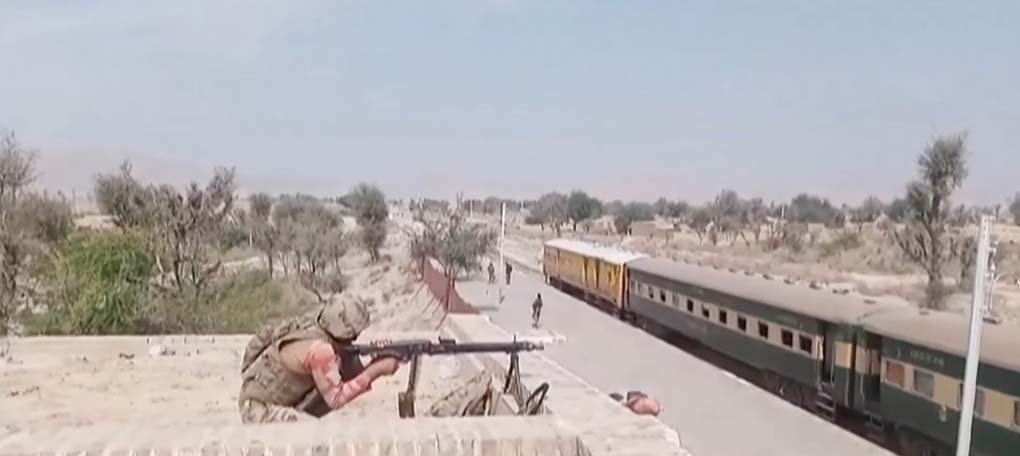Introduction
Ending a 16-hour standoff with an armed militant group, Pakistani security officials effectively evacuated hundreds of people from a seized train in southwest Balochistan province during a difficult midnight operation. On the Quetta-Taftan railway line close to the Iran border, armed gunmen demanding freedom of imprisoned militants kidnapped 450 passengers. Early Thursday’s spectacular rescue, verified by Pakistan’s Interior Ministry, has spurred discussions on regional security, separatist tensions, and the vulnerability of vital infrastructure in conflict-torn regions once again.
This article unpacks the timeline of events, survivor accounts, and the broader implications of this brazen attack—one of the largest hostage situations in Pakistan’s recent history.
The Hijacking: A Night of Terror on the Taftan Express
According to Dawn News, the Quetta-Taftan Express—a vital rail link connecting Pakistan to Iran—was ambushed late Wednesday by approximately 30 militants disguised as local police. Stopping the train close to the isolated town of Nushki, the terrorists cut off communications and detained passengers under gunpoint. Al Jazeera said that the assailant, thought to be a member of the Baloch Liberation Army (BLA), a separatist group classified as a terrorist organization by Pakistan, demanded safe passage to Afghanistan and release of fifty imprisoned members.
As militants tore through the train, passengers detailed disorderly scenes. They yelled at us to turn over wallets and phones. Farid Ahmed, a 45-year-old shopkeeper traveling with his family, claimed several tried to resist but fired guns into the air. Reuters, which conducted several survivor interviews, confirmed his story.
The Rescue: Swift Action, Lingering Questions
Pakistani paramilitary forces, including the Frontier Corps and Counter-Terrorism Department (CTD), surrounded the train within hours. Negotiations stalled, prompting a midnight raid. The Express Tribune cited military sources stating that 12 militants were killed in the operation, while all passengers were evacuated safely—though 14 sustained minor injuries.
The administration praised the rescue as a “victory for national resilience,” but others questioned how militants could hijack a train in a high-security zone. “This wasn’t just a security lapse—it’s a systemic failure,” said Islamabad-based security analyst Tariq Khan in an interview with BBC Urdu. “The Quetta-Taftan route is notorious for militant activity. Why weren’t there adequate checks?”
Human Toll: Trauma and Resilience
Behind the headlines lie stories of terror and solidarity. Amina Bibi, a mother of three, recounted hiding her children under seats: “I prayed silently, thinking we might not survive.” Others, like university student Hassan Raza, organized passengers to distribute water and calm panicked travelers.
Local communities near Nushki also played a crucial role. Villagers provided food and blankets to stranded passengers after the rescue. “We may live in a conflict zone, but we haven’t forgotten our humanity,” said Nushki resident Abdul Qadir, speaking to Arab News.
Balochistan’s Simmering Conflict: A Regional Tinderbox
The hijacking underscores Balochistan’s volatile security landscape. The resource-rich province has endured decades of insurgency led by groups like the BLA, who accuse the central government of economic marginalization and human rights abuses. Human Rights Watch has documented allegations of enforced disappearances and extrajudicial killings on both sides, fueling a cycle of mistrust.
China’s $60 billion China-Pakistan Economic Corridor (CPEC), which traverses Balochistan, has further inflamed tensions. Militants have repeatedly targeted CPEC projects, viewing them as exploitative. Thursday’s attack occurred just 200 km from Gwadar Port, a CPEC flagship site.
International Reactions: Concerns Over Spillover Effects
The incident has drawn global attention, with neighboring Iran and Afghanistan denying allegations that militants crossed their borders. Meanwhile, Reuters notes that U.S. officials are monitoring the situation closely, given Balochistan’s proximity to Afghanistan and ongoing counterterrorism collaborations with Pakistan.
India, however, seized the moment to criticize Pakistan’s counterinsurgency efforts. “This is what happens when terrorism is tolerated,” said Indian Foreign Ministry spokesperson Randhir Jaiswal, a remark dismissed by Islamabad as “opportunistic.”
What’s Next? Security Overhauls and Political Fallout
In the aftermath, Pakistan’s Prime Minister Shehbaz Sharif has ordered a “full audit” of rail security and vowed to accelerate development projects in Balochistan. But skepticism runs deep. “We’ve heard these promises before,” said Baloch activist Mama Qadeer in a Dawn TV interview. “Unless there’s real dialogue, the violence won’t stop.”
The attack also raises alarms about the potential for copycat incidents. “Militant groups are evolving—they’re targeting soft infrastructure to maximize psychological impact,” warned security expert Ayesha Siddiqa in The Diplomat.
Conclusion: A Narrow Escape, but a Long Road Ahead
While the rescue of 450 people marks a rare triumph in Pakistan’s challenging security landscape, the hijacking highlights fissures that endanger regional peace. For Balochistan’s suffering population, the tragedy is a terrible reminder of daily living under the shadow of conflict.
As the dust settles, questions linger: Can Pakistan address Baloch complaints before another crisis erupts? And will international partners step beyond rhetoric to support lasting peace? For now, survivors like Farid Ahmed are simply grateful: “We’re alive, but I’ll never forget those hours. No one should endure this.”
Related Video:
Sources:
- Dawn News: Provided initial reports on the hijacking, rescue timeline, and statements from Pakistan’s Interior Ministry.
- Al Jazeera: Detailed militant demands and regional security context.
- Reuters: Verified survivor accounts and international reaction statements.
- The Express Tribune: Cited military sources on rescue operation specifics and militant casualties.
- BBC Urdu: Interviewed security analyst Tariq Khan on systemic security failures.
- Arab News: Highlighted local community responses and quotes from Nushki residents.
- Human Rights Watch: Contextualized Balochistan’s human rights challenges.
- Dawn TV: Featured activist Mama Qadeer’s critique of government promises.
- The Diplomat: Included expert analysis by Ayesha Siddiqa on militant tactics.
Explore More:
- Devastating Arizona Midair Crash: 2 Lives Lost at Marana Airport
- North Sea Disaster: Oil Tanker & Cargo Ship Collision
- Tragic Midair Collision Close to Washington, D.C.: No Survivors Anticipated
- Seven Dead in Devastating Stampede at India’s Maha Kumbh
- Saif Ali Khan Stabbed: Intruder Detained After Mumbai Knife Attack

